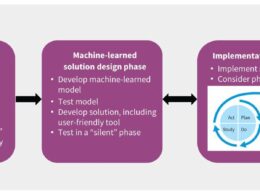This is a republication of the article “Why Your Company Needs Data-Product Managers”, with the title above. The article is preceded by an Executive Summary, by the Editor of the Site.
Harvard Business Review
Thomas H. Davenport, Randy Bean, Shail Jain
October 13, 2022
Executive Summary by:
Joaquim Cardoso MSc.
Health Transformation Institute (HTI)
October 13, 2022
Overview:
- As companies have struggled to make use of datasets and AI, many have started to create data products — reusable datasets that can be analyzed in different ways by different users over time to solve a particular business problem.
- Data products can be a powerful tool, especially for large, legacy companies, but often require companies to create a new role that’s distinct from chief digital officer and product manager: the data product manager.
- Data product managers, like product managers of other types, don’t have all the technical or analytical expertise to create the model or engineer the data for it.
- They are unlikely to be gifted at redesigning business processes or retraining workers either.
- What they do need to have is
(1) the ability to manage a cross-functional product development and deployment process, and
(2) team of people with diverse skills to perform the needed tasks.
Conclusion:
- Data product manager, then, is one of the new jobs in the economy that has been created by digitization, pervasive data, and the analytics and AI that can digest it.
- As we create more specialized technical roles like data scientist and data engineer, we need people with broad business skills who can work across the different roles, combine them into effective teams, and bring them home to deliver value to enterprises.
- Despite a high degree of specialization in the skills for data, analytics, and AI, the need for generalists never seems to go away.
ORIGINAL PUBLICATION (full version)

Why Your Company Needs Data-Product Managers
Harvard Business Review
Thomas H. Davenport, Randy Bean, Shail Jain
October 13, 2022
There’s a familiar problem with companies’ efforts to build AI and analytics applications:
They hire or engage with data scientists to build models, but the models are rarely deployed into production.
A recent survey of data scientists found that the majority saw 20% or fewer of their models go into production deployment.
A recent survey of data scientists found that the majority saw 20% or fewer of their models go into production deployment.
In response, many companies have adopted the concept of data products — an attempt to create reusable datasets that can be analyzed in different ways by different users over time to solve a particular business problem.
While some incorporate AI and analytics, others don’t, and so some organizations use two terms:
- data products (which are datasets suitable for reuse) and
- analytics products (which incorporate analytics or AI methods to analyze the data).
While our definition of data products includes both data and analytics/AI, all that really matters is that an organization is clear on its terminology; a product orientation is useful for both data and analytics/AI.

Data products can be a powerful tool, especially for large, legacy companies.
At Vista, the marketing and design services company, data products have been responsible for an incremental $90 million in profits, much of them recurring annually, according to Sebastian Klapdor, the company’s chief data officer.
At Alabama-based Regions Bank, chief data and analytics officer Manav Misra says data products have earned or saved hundreds of millions of dollars for the bank.
This idea isn’t necessarily new. Data products involving analytics have been in use for at least a decade at digital-native firms.
But as legacy companies start to adopt them, many are struggling with implementing the idea — both internally and for customers.
For one, they typically sell tangible products, and may struggle with data products as a result.
And while many large companies are naming chief data officers, product management disciplines aren’t generally inherent in CDO roles.
Data scientists in legacy companies, of course, understand how to create analytical and AI models, but many believe their jobs are done when they create a model that fits the data well.
Data scientists in legacy companies, of course, understand how to create analytical and AI models, but many believe their jobs are done when they create a model that fits the data well.
What legacy companies need to successfully create and deliver data products is to create a new role with a different set of skills from both CDOs and data scientists: the data product manager.
What legacy companies need to successfully create and deliver data products is to create a new role with a different set of skills from both CDOs and data scientists: the data product manager.

Enter the Data Product Manager
Data product managers, like product managers of other types, don’t have all the technical or analytical expertise to create the model or engineer the data for it.
They are unlikely to be gifted at redesigning business processes or retraining workers either.
What Data Product Managers are not? DPMs like product managers of other types, (1) don’t have all the technical or analytical expertise to create the model or engineer the data for it. (2) They are unlikely to be gifted at redesigning business processes or retraining workers either.
What they do need to have is the ability to manage a cross-functional product development and deployment process, and a team of people with diverse skills to perform the needed tasks.
They must also be able to communicate effectively with the business leaders whose operations are going to be changed by the model and the programming surrounding it.
What Data Product Managers not? What DPMs need to have is (1) the ability to manage a cross-functional product development and deployment process, and (2) a team of people with diverse skills to perform the needed tasks, (3) be able to communicate effectively with the business leaders …
There are already models for what this role can look like.
Some of the same skills needed for data products are found in software product management, including coordinating across functions and units, managing diverse teams, exercising influence without formal authority, and understanding customer needs.
And since data products also involve software, both software and data product managers need to understand software development.
And since data products also involve software, both software and data product managers need to understand software development.
But there are unique skills as well.
Data product managers, of course, need to know a good bit about data: how to capture it, extract it from databases, improve its quality, integrate it with other data, and so forth.
They also need to understand analytics and AI, although not as well as data scientists do.
They need to be well-versed in basic statistics, to know the key types of AI and their data and modeling requirements, to understand how machine learning works, to be aware that models can “drift” over time, and to be familiar with the AI vendor landscape.

Consider how these products are developed and used.
Data products almost always start with a minimum viable product (MVP)-based approach …
… — creating a bare-bones product to start getting customers or users interested — then require an ongoing iteration cycle that allows for new versions of the product on a rolling basis, says James Stephenson, a consultant for data product management efforts and a former leader of data products himself.
Vista’s Klapdor has put his own spin on this process. The initial goal, he argues, should be the development of a “minimum lovable product,” and then the creation of a scaleable product. Klapdor found that internal or external customers often didn’t like MVPs because they lack polish and functionality, so he insists upon creating something loveable for them.
Data product management responsibilities don’t end with deployment.
Data product managers are responsible for ensuring and measuring the ongoing use and value of the data product on a quarterly basis, whether the product has internal or external customers.

What Kinds of People Make Good Data Product Managers?
The only consensus among devotees of data product management is that the product managers need to have both a business orientation and a familiarity with data and analytics, and that they need to be able to lead a diverse team.
Our sources also agreed that data scientists don’t generally make good data product managers — they are excessively focused on optimizing the fit of models to their data — but Klapdor has found them useful in the role for highly technical data products.
So what do experts look for?
Klapdor sometimes looks for data product managers with domain expertise for products requiring it — in specialized areas such as dynamic pricing, media mix models, attribution models, and manufacturing analytics.
The other reliable source of data product managers at Vista is seasoned product managers from software companies, whom Klapdor says usually know how to manage the process.
James Stevenson argues that data product managers should have some experience with product management in general.
They shouldn’t be data scientists, he believes, because they make too many decisions on their own.
Data product managers should also understand the data aspect of the role, even though that’s less important than other dimensions.
Stevenson sees three co-equal leaders of the product effort: a data product manager, a data scientist, and an engineering lead.
These three equally empowered leaders, he argues, should have a healthy tension — fighting for what they want, but expecting compromise from each other. No one leader should have dominance.
Stevenson sees three co-equal leaders of the product effort: a data product manager, a data scientist, and an engineering lead.
Misra at Regions Bank established the role of “data product partner,” which functions as a data product manager for a specific part of the bank.
He had to bring in new people for the role who would be responsible for a complete data or advanced analytics solution.
His data project partners are very focused on how the product is adopted and used, what the user interface looks like, how many people use it, and how it creates value for the bank.
They sit in staff meetings, understand the priorities of that part of the business, and do bi-directional translation between business needs and opportunities and the solutions that can address them.
Most came from the business side, but have a technical and analytical orientation as well.
Misra at Regions Bank established the role of “data product partner,” which functions as a data product manager for a specific part of the bank.
Most came from the business side, but have a technical and analytical orientation as well.

Data product manager, then, is one of the new jobs in the economy that has been created by digitization, pervasive data, and the analytics and AI that can digest it.
As we create more specialized technical roles like data scientist and data engineer, we need people with broad business skills who can work across the different roles, combine them into effective teams, and bring them home to deliver value to enterprises.
Despite a high degree of specialization in the skills for data, analytics, and AI, the need for generalists never seems to go away.
Originally published at https://hbr.org on October 13, 2022.
Names mentioned
Sebastian Klapdor, the company’s chief data officer
James Stephenson, a consultant for data product management efforts and a former leader of data products himself.












